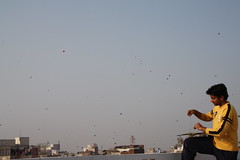 |
| Kite Festival in Jaipur |
I've been thinking a lot about this idea of "going up," and about the many ways we humans have devised for reaching for something beyond ourselves. Yesterday evening, a group of us took a bus ride to the outskirts of Jaipur with the intention of visiting the Galtaji Temple. This temple ended up being inaccessible, so we found ourselves climbing a hill to the Surya Mandir Temple instead: a small, lavender temple located atop a hill overlooking the entire city. As we ascended and descended, we were enveloped by crowds of cheerful, excited people -- people drawn up the hill by the imperative to perform an evening puja to the sun god, Surya, or, in the case of the great majority of the women and children, by the evening meal being distributed by temple authorities in celebration of a local festival. Whatever their purpose in being there, almost everyone on the hill sparkled with that particular kind of mirth that arises out of the confluence of a warm sunset, a tasty meal, and a horde of excited children.
Emile Durkheim, renowned sociologist of religion, claimed that all religions might be understood as institutions born out of our desire to connect and reconnect with this communal mirth -- this "collective effervescence." Religion is, Durkheim might say, a key means by which people have endeavored to "go up" beyond the conditions of mundanity, sadness, and finitude that mark so much of our lives.
I don't know whether God(s) exist(s), and I don't expect to find out anytime soon. What I do know, though, is that the procession we took part in, the cheerful hospitality we enjoyed, and even the tasty, spicy snack we ate, all unfolded under the auspices of the little lavender temple at the summit of the hill just above us. If Surya hadn't been there (go ahead and add a "so to speak" if you want to maintain your critical distance from Surya), we wouldn't have been either. And, I imagine, neither would many of those friendly, festival-celebrating people.
This morning, we spent the first part of the day at the Jantar Mantar, a park of giant time-keeping and astronomical devices constructed out of rock and marble. I stared in overwhelmed, dumbfounded awe at a giant sun dial whose towering centerpiece managed to cast a delicate shadow at precisely the correct time along an enormous ruler. I was reminded once again about this human desire to go up; to bend earthly materials to the task of connecting us to the vastness of sun, space, and planets. Most fascinating of all to me was Padma's reminder to us as we stood among these stunning calculators: originally, these scientific instruments were designed for the purpose of tracking holy days and for "calculating" the activities of the gods.

Lovely post - thank you for "taking us there". - Opal
ReplyDeleteLoving your posts Jenna! Living vicariously...
ReplyDeleteGreat post, Professor Reinbold! And of course, cheers for referencing our good friend Durkheim and collective effervescence.
ReplyDeleteDoctor Reinbold, I am continuously and constantly stunned by your writing. Thank you for your insights, observations, pithy context, and great joie de vivre. I cannot wait to read your next offering...!
ReplyDeleteHey Jenna!
ReplyDeleteDespite your professed reluctance, you really are a wonderful and thoughtful blogger. It's so nice to be able to follow you on your trip. I especially enjoyed your description of the festival at the Surya Mandir Temple. I have had similar moments in my life where I felt that I was sharing this sort of ethereal happiness with strangers through a shared experience. 'Collective effervescence' is the perfect description for it and I can see Durkheim's reasoning in stating that religions form from a desire to feel this connection. I hope that he is right. It is such a wonderful experience and a great basis to form a belief system. But I see very little of this "communal mirth" in many of the major religions of the world. It seems to me (granted I only really know Catholicism and even then not all that well)that most religions seem to focus on a connection with the divine and rather ignore our connections to each other and the happiness these relationships can bring. If this 'communal mirth' is what we desired in the first place why turn it into something outside ourselves (the divine)? Why are there no religions that are just about earth relationships with our fellow human beings? Religion is fascinating!
Anywho have a great rest of your trip! Thanks for giving me something to ponder!
Thank you all for these kind comments! It was a bit of a daunting task to attempt to articulate these experiences and to bring together my somewhat scattered thoughts on the matter (strangely, a bit of sleep deprivation may actually have helped me get this post off the ground!).
ReplyDeleteJuls: You ask a tough question! I'm sure many religious people would say that religions focus on the divine because the divine is in fact the ultimate reality. From a sociological perspective, though, it certainly does become difficult to account for some of the more "anti-social" elements of certain religions. (In his extensive theorization of religion, Durkheim never really managed to account for these elements, as Kate will attest!)